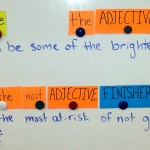"Mr. Spencer, why aren't you doing STEM projects with us?" a student asks.
"We're doing some of them," I point out.
"But not like you did when you taught eighth grade," she says.
"True, but I had more freedom. I do the best I can, but I didn't have to teach grammar for a full hour back then. I had more . . ."
"Freedom?" she asks.
"Yeah, I had more freedom."
I volunteered to teach ELL because I believe in the power of language. I wanted to see students learn to master English and, more importantly, find their own voice. I had plans to integrate grammar and conversation into STEM and humanities lessons. Sure, I could follow the time constraints of the four hour block, but I would do so in a connective way.
I assumed the biggest barriers I would face would be pedagogical ones. Would I construct the right sentence stems? Would I help support oral language with technology? Would I manage to push critical thinking while also providing scaffolding.
Instead, I quickly found that my greatest challenges were external policies. For example, the lesson plan format, the language objectives and the rigid separation of the Four Hour Block (exactly an hour in separate, sequential, I do – we do – you lessons) prevented me from creating thematic units based upon a constructivist pedagogy.
I also found that I had to "sneak" in social studies and science. Instead of following natural inquiry, I had to use science as a way to practice oral language and content vocabulary. I didn't have the freedom to teach in a way that helps promote critical thinking.
In other words, the poor policy decisions at a state and district level reduced the level of critical thinking and quality discourse that I wanted my students to experience. True, I stuck with project-based learning, but the projects were choppy. I continued to promote discourse, but it was often far removed from the moment in a lesson where discourse should have been occurring.
I am now at a place where I am breaking the rules (or at least bending them) in order to promote the kind of education that students in other classrooms recieve. I still support language, but the reality is that my classroom is packed full of students who have been ELL since kindergarten. It isn't that they don't speak English. Instead, they are the victims of bad pedagogy shaped by bad policy.








